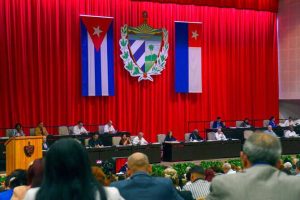
The Cuban National Assembly has approved a landmark constitutional amendment scrapping the maximum age limit of 60 years for presidential candidates, a move expected to reshape the island nation’s political landscape ahead of the 2028 general elections.
Naija News reports that, previously, the Cuban constitution stipulated both a minimum age of 35 and a maximum of 60 for presidential aspirants.
However, following Friday’s plenary session, the age ceiling has been removed, although the two-term limit of five years each remains intact.
Announcing the development, National Assembly President Esteban Lazo stated that the newly approved measure by the Council of State will now allow any Cuban citizen “in the full exercise of their physical and mental faculties, with… loyalty and revolutionary trajectory,” to contest the presidency, regardless of age.
Notably, former President Raul Castro, 94, was the first to cast his vote in favour of the amendment, signalling continued influence from revolutionary-era leaders within the government ranks.
The incumbent President, Miguel Díaz-Canel, now 65 years old, was first elected in 2018 and re-elected in 2023. While the amendment does not impact his current tenure directly, it positions him, or any future candidate over the previous age limit, as eligible in subsequent cycles, provided the two-term cap isn’t breached.
No official successor has been announced by the ruling Communist Party, but analysts suggest this move could potentially broaden the field for older revolutionary figures to re-emerge in top roles.
Critics and observers are divided over the implications of the amendment. While some interpret it as a necessary flexibility for a country with an ageing revolutionary leadership, others see it as a potential loophole for extended power play.
The 2019 constitution, which introduced the term and age limits, marked a historic departure from nearly 60 years of continuous rule by Fidel Castro and his brother Raúl Castro, a dynamic that had defined modern Cuban history.
Fidel Castro officially handed over power to Raúl in 2008 due to failing health, ending a leadership era that began with the Cuban revolution in 1959. Raúl himself stepped down as Communist Party first secretary in 2021, ceding the country’s leadership to Díaz-Canel.
Naija News understands that the constitutional reform in Cuba comes amid the most severe economic downturn the country has faced in over three decades.
The island nation, home to nearly 10 million people, is grappling with chronic shortages of food, medicine, and fuel, as well as prolonged blackouts and an unprecedented wave of emigration.
With public discontent growing, many view the timing of the reform as strategic, aimed at maintaining control over the political narrative ahead of a potentially turbulent election season in 2028.
The government has not yet confirmed whether Díaz-Canel will run again, or if new candidates from the revolutionary old guard or a younger generation will be allowed to contest the election.
The post 2028 Election: 60-Year Presidential Candidate Age Limit Lifted In Cuba appeared first on Naija News.


